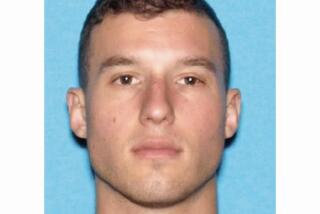Skinhead Leader Seeks Low-Security Prison : Courts: Christopher Fisher’s lawyers urge nonviolent setting. They say he’s vulnerable and needs role models.
Attorneys for Christopher D. Fisher, leader of a group of violent skinheads, have asked a Los Angeles judge to recommend that Fisher be sent to the low-security federal prison at Boron in Kern County because of his “particular vulnerability.”
The lawyers, Anna Ho and Michael S. Meza, contend that Fisher would receive therapy and counseling and be in contact with positive role models because there are no violent individuals in low-security prisons, according to papers filed in connection with Fisher’s sentencing.
On Monday, U.S. District Judge W. Matthew Byrne Jr. continued a sentencing hearing until Thursday after federal probation officials asked for additional time to respond to papers filed Friday by the defense lawyers.
It is unclear what significance the voluminous court filing may have because federal prosecutors and the defense lawyers earlier agreed that a 10-year prison term would be appropriate. But the thrust of the papers indicates that the defense lawyers are hoping for a shorter sentence.
In October, Fisher, 20, admitted that he plotted to launch a race war with attacks on a Southern California church and a synagogue. In return for guilty pleas to two counts of an indictment against him, the government agreed to drop several charges.
Fisher acknowledged that he and other white supremacists bombed two homes and a car, vandalized a Westminister synagogue and plotted to attack the First African Methodist Episcopal Church in the Mid-City area as well as other targets, including prominent members of the Orange County Jewish community.
Fisher was evaluated by a psychiatrist and psychologist, whose bills were paid by the defense. Dr. Louis Jolyon West, professor of psychiatry at UCLA, considered an expert on cults and political fringe groups, said Fisher “is very different in background, education and personality from the average skinhead.”
“The racist character of Fisher’s beliefs arose in part from resentment of his parents’ devotion to helping the underprivileged and various minority groups while (in his view) relatively neglecting him,” West wrote in his Dec. 26 report.
*
Fisher also was “influenced by experiences of intimidation by nonwhite gang members, and by a perception that through reverse discrimination he was left relatively weak, vulnerable and abandoned by the power structure,” West wrote.
“I see him as a good candidate for rehabilitation if his forthcoming experience in prison is not protracted and is carried out in a situation appropriate to a truly corrective goal,” such as a low-security prison, West said.
“In a general prison population, where racial gangs often prevail, he would promptly be taken over and thus protected by the white supremacists . . . the alternative might be his death by assassination,” West wrote.
“Multiple personality tests indicate a severely depressed, non-psychotic young man, overwrought with guilt, remorse, regret and low self-esteem,” according to a report by Morris J. Paulson, professor emeritus of psychology at UCLA, who administered a psychological evaluation of Fisher in mid-December.
Paulson said Fisher was troubled for years by “almost unbearable, anxiety-provoking stress” because of being unable to meet the expectations of his parents, who told him that he had a IQ of 150 when, in fact, his IQ is 127.
More to Read
Sign up for Essential California
The most important California stories and recommendations in your inbox every morning.
You may occasionally receive promotional content from the Los Angeles Times.










